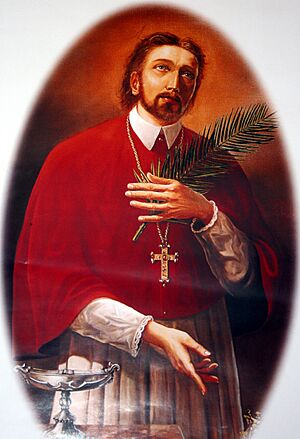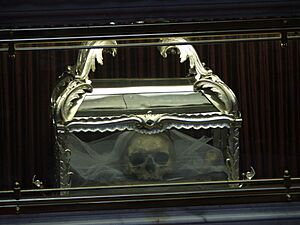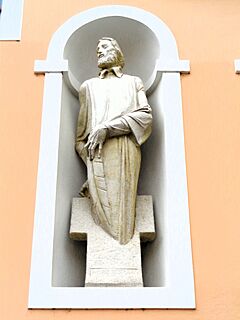Marko Krizin facts for kids
Quick facts for kids SaintMarko Stjepan Krizin |
|
|---|---|
 |
|
| Martyr | |
| Born | Marko Stjepan Krizin c. 1589 Križevci, Kingdom of Croatia, Habsburg monarchy |
| Died | 7 September 1619 (aged 29–30) Kassa, Kingdom of Hungary, Habsburg Monarchy |
| Venerated in | Roman Catholic Church |
| Beatified | 15 January 1905, St. Peter's Basilica, Rome, Kingdom of Italy, by Pope Pius X |
| Canonized | 2 July 1995, Košice, Slovakia, by Pope John Paul II |
| Major shrine | Esztergom Basilica, Church of the Holy Trinity, Košice |
| Feast | 7 September |
Marko Stjepan Krizin (born around 1589 – died September 7, 1619) was a Croatian Catholic priest. He was also a professor and missionary in the 1600s. He lived during a time when there were big disagreements between Catholics and Protestants (like Calvinists). Marko was killed because of his Catholic faith. The Catholic Church later declared him a saint. He was the third person from Croatia to become a saint.
Contents
Marko's Early Life and Education
Marko Krizin was born in a town called Križevci in the Kingdom of Croatia. He started his studies at a Jesuit school in Vienna. Later, he went to the University of Graz. There, he earned a special degree called a Doctor of Philosophy.
Studying to Become a Priest
Marko wanted to become a Catholic priest. So, he moved to Rome to study at a famous school called the Collegium Germanicum et Hungaricum. He wrote down that he was Croatian in a document at the school. Marko was a smart and thoughtful student. He studied in Rome from 1611 to 1615.
Marko's Work as a Priest
After becoming a priest, Marko Krizin went back to his home area. He did not stay there for long. A very important church leader, Cardinal Péter Pázmány, asked Marko to come work for him. The Cardinal was the Archbishop of Esztergom. He made Marko the head of a local seminary (a school for priests). He also made him a canon, which is a special priest who helps lead a cathedral.
A New Mission in Hungary
In early 1619, Marko was sent to manage some land near a city called Kassa in Hungary. Today, this city is known as Košice in Slovakia. Around this time, a Protestant prince named Gábor Bethlen started a rebellion. He was fighting against the Austrian Habsburgs, who ruled Hungary.
The Story of Marko's Martyrdom
At that time, Kassa was a strong center for Protestants, especially Calvinists. The city's governor, Andrija Dóczi, was Catholic. He brought two Jesuit priests, István Pongrácz and Melchior Grodziecki, to Kassa. Their arrival made many Calvinists in the city upset.
The Rebellion in Kassa
On July 13, 1619, the Calvinists started a rebellion. They falsely accused the Catholics of setting fires. In September, the Calvinist army surrounded the city. On September 5, Governor Dóczi was betrayed by his own soldiers. He was handed over to the Calvinist army leader, George I Rákóczi. The Protestants then declared Prince Bethlen the new leader of Hungary.
Marko Krizin was staying at the Jesuit Church of the Holy Trinity with the two Jesuit priests. The Calvinist soldiers arrested all three priests. They were left without food or water for three days.
A Difficult Decision
During this time, the city leaders decided what to do with the Catholic people. A Calvinist minister wanted all Catholics in the city to be killed. But most Protestants did not agree with such a terrible plan. However, they did approve the execution of the three priests.
The Calvinist commander offered Marko Krizin land and wealth. All he had to do was give up his Catholic faith and become a Calvinist. Marko refused. The three priests were then tortured and soon killed by being beheaded.
The news of their deaths spread quickly across Hungary. It shocked both Catholics and Protestants. Prince Gabriel refused to let them be buried properly at first. But after six months, a Countess asked him again. Finally, he allowed them to have a proper burial.
Marko's Legacy and Sainthood
The three priests were declared "blessed" (a step towards sainthood) on January 15, 1905, by Pope Pius X. They were officially made saints by Pope John Paul II on July 2, 1995, in Košice.
Today, parts of the Košice martyrs' remains are in different places. You can find them in the Basilica of Esztergom and the Ursuline Church of St. Anna in Trnava.
The special day to remember Saint Marko Križevčanin is September 7. His hometown of Križevci celebrates this day with a week of festivities.
 | Audre Lorde |
 | John Berry Meachum |
 | Ferdinand Lee Barnett |



